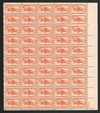
# 894 - 1940 3c Pony Express 80th Anniversary
3¢ Pony Express Rider
City: St. Joseph, MO, Sacramento, CA
Quantity: 46,497,400
Printed by: Bureau of Engraving and Printing
Printing Method: Rotary Press
Perforations: 11 x 10.5
Color: Henna brown
Inaugural Run Of The Pony Express
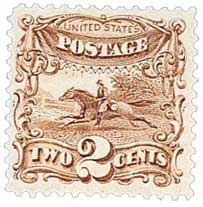
On April 3, 1860, the Pony Express made its first trip from St. Joseph, Missouri, to Sacramento, California.
In 1860, William Russell, Alexander Majors, and William B. Waddell sought to create a mail-carrying company that would be faster and more efficient than the stagecoaches of the Butterfield Overland Mail. At that time, it could take months for mail to be delivered to the unsettled West by stagecoach.
They established 184 stations 10-15 miles apart in just two months. The three founders then put a call out for small, brave young men that could ride a horse well. 400 of the fastest horses they could find were purchased and 80 daring riders were hired. The first ride left St. Joseph, Missouri, on April 3, 1860, and arrived in Sacramento, California, just ten days later. In the mochilla, or saddlebag, was a message of congratulations from President Buchanan to the governor of California, which had been telegraphed from Washington to St. Joseph.
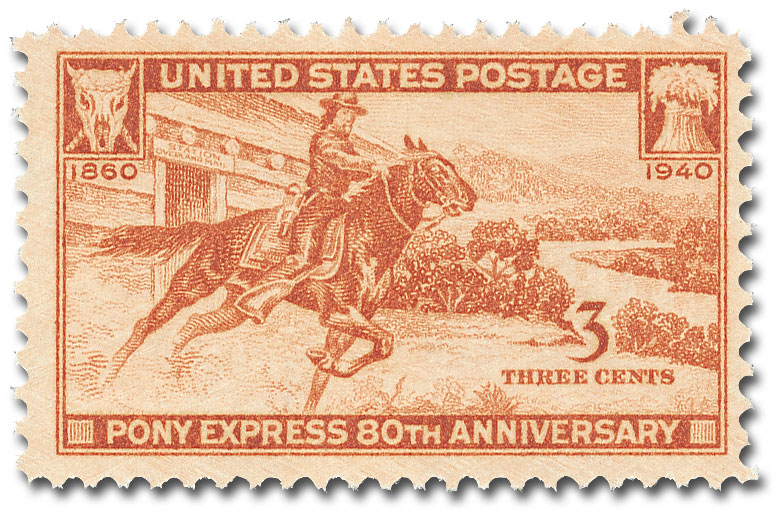
The rides were dangerous, but the pay was good – $25 a week, or the equivalent of over $5,800 in wages today. These were the Pony Express riders. The men, usually younger than 18 years old, were expected to cover 75 miles without rest, despite inclement weather and Native American attacks. Picking up a rested horse at each station, they rode non-stop, day and night, rain or shine.
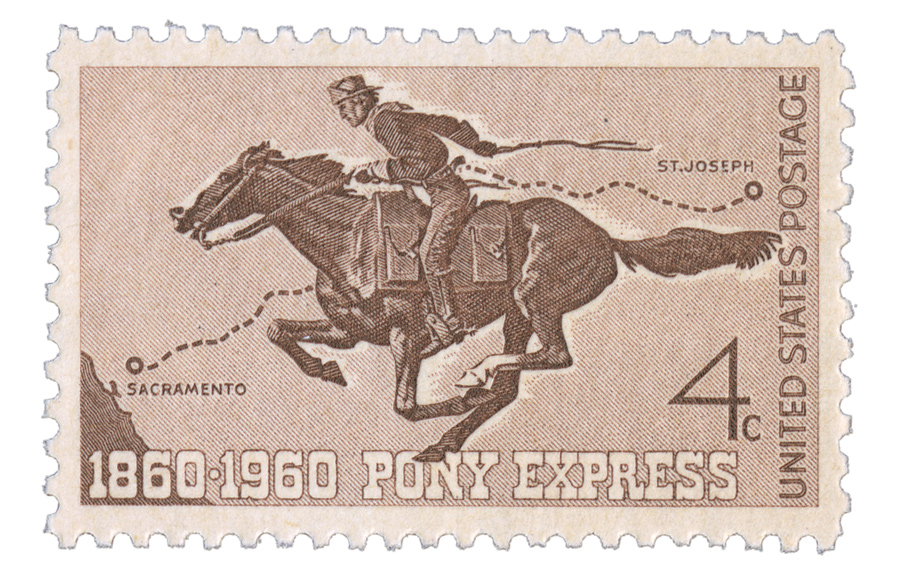
Buffalo Bill Cody, who became famous for his Wild West Show, claimed he rode for the Pony Express when he was just 15 years old. His route was through Wyoming and he told of one time when he rode 322 miles round trip because his relief rider had been killed in a brawl.
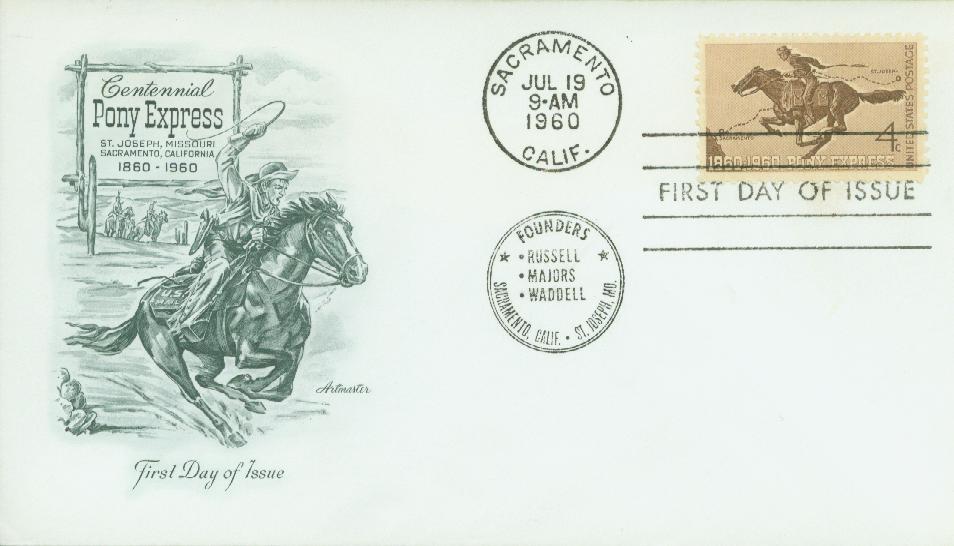
Their route could be completed in eight days, which was 12 to 14 days faster than the Overland Mail. The fastest trip was seven days when riders delivered the news of Abraham Lincoln’s presidential election in November of that year. With extra riders and horses in place, the news traveled from Fort Kearny, Nebraska, where the eastern telegraph line ended, to the start of the western line at Fort Churchill, Nevada Territory. Newspapers in California were able to report Lincoln’s victory in an unprecedented eight days after the election.
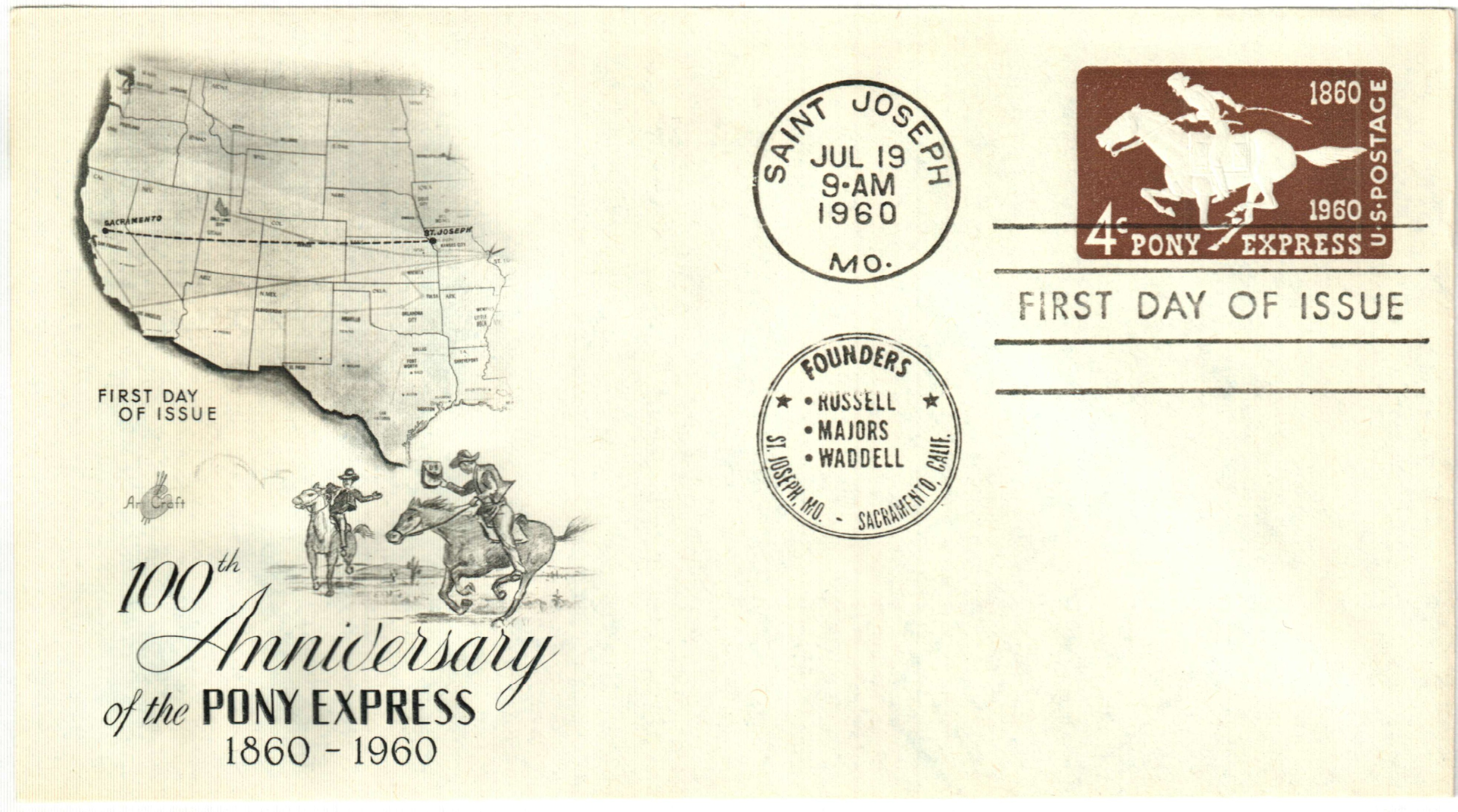
Initially, it cost $5 to send a letter between San Francisco and St. Joseph, Missouri, but that charge was later reduced to $1. An estimated 35,000 letters were carried by the Pony Express.
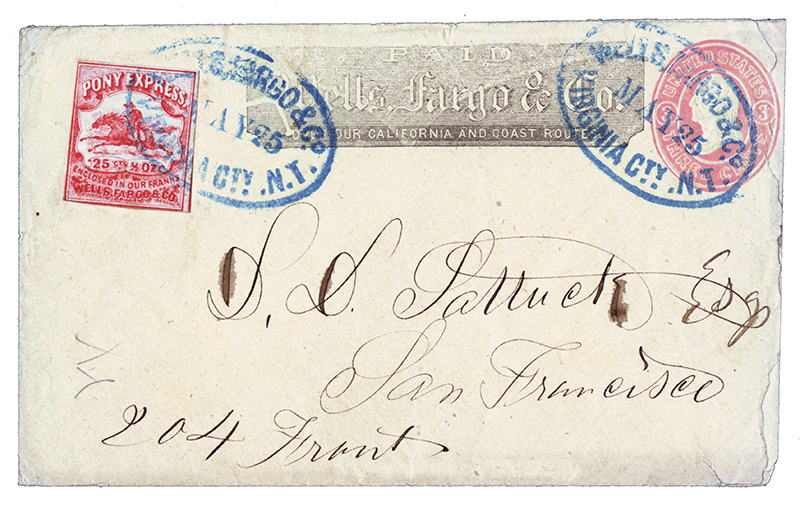
This adventurous service came to an end just 18 months after that first ride. On October 24, 1861, the Western Union Telegraph Company completed the first transcontinental telegraph line in Salt Lake City. This accomplishment ushered in a new age of communications in the US It also marked the end of the Pony Express two days later, on October 26. In spite of its fame, the Pony Express was a financial failure.
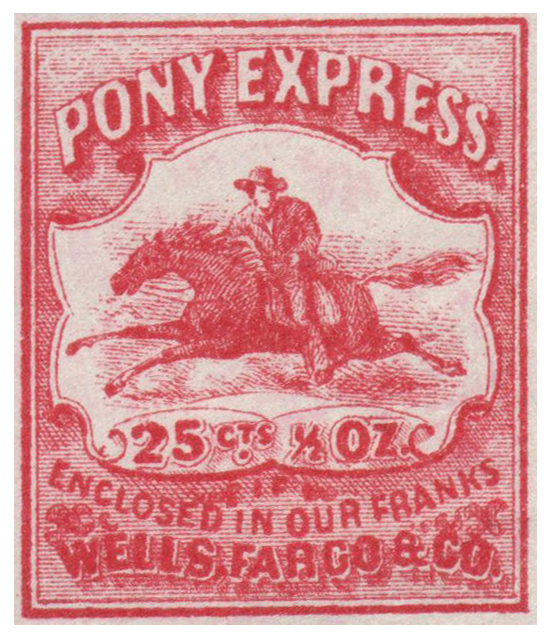
Then in 1862, Wells, Fargo & Company established its own Pony Express, dubbed the “Virginia City Pony.” This service traveled between mining towns in Nevada and the California business centers of Sacramento and San Francisco. While the original Pony Express delivered news, the Virginia City Pony was more concerned with business matters. Improvements in the roads allowed for faster transportation and the Virginia City Pony was discontinued in 1865.
Click here for more Pony Express stamps.
There are lots of interesting sites dedicated to the Pony Express where you can continue reading:
The National Pony Express Association
The Pony Express National Historic Trail
The Pony Express Museum in St. Joseph, Missouri
3¢ Pony Express Rider
City: St. Joseph, MO, Sacramento, CA
Quantity: 46,497,400
Printed by: Bureau of Engraving and Printing
Printing Method: Rotary Press
Perforations: 11 x 10.5
Color: Henna brown
Inaugural Run Of The Pony Express

On April 3, 1860, the Pony Express made its first trip from St. Joseph, Missouri, to Sacramento, California.
In 1860, William Russell, Alexander Majors, and William B. Waddell sought to create a mail-carrying company that would be faster and more efficient than the stagecoaches of the Butterfield Overland Mail. At that time, it could take months for mail to be delivered to the unsettled West by stagecoach.
They established 184 stations 10-15 miles apart in just two months. The three founders then put a call out for small, brave young men that could ride a horse well. 400 of the fastest horses they could find were purchased and 80 daring riders were hired. The first ride left St. Joseph, Missouri, on April 3, 1860, and arrived in Sacramento, California, just ten days later. In the mochilla, or saddlebag, was a message of congratulations from President Buchanan to the governor of California, which had been telegraphed from Washington to St. Joseph.

The rides were dangerous, but the pay was good – $25 a week, or the equivalent of over $5,800 in wages today. These were the Pony Express riders. The men, usually younger than 18 years old, were expected to cover 75 miles without rest, despite inclement weather and Native American attacks. Picking up a rested horse at each station, they rode non-stop, day and night, rain or shine.

Buffalo Bill Cody, who became famous for his Wild West Show, claimed he rode for the Pony Express when he was just 15 years old. His route was through Wyoming and he told of one time when he rode 322 miles round trip because his relief rider had been killed in a brawl.

Their route could be completed in eight days, which was 12 to 14 days faster than the Overland Mail. The fastest trip was seven days when riders delivered the news of Abraham Lincoln’s presidential election in November of that year. With extra riders and horses in place, the news traveled from Fort Kearny, Nebraska, where the eastern telegraph line ended, to the start of the western line at Fort Churchill, Nevada Territory. Newspapers in California were able to report Lincoln’s victory in an unprecedented eight days after the election.

Initially, it cost $5 to send a letter between San Francisco and St. Joseph, Missouri, but that charge was later reduced to $1. An estimated 35,000 letters were carried by the Pony Express.

This adventurous service came to an end just 18 months after that first ride. On October 24, 1861, the Western Union Telegraph Company completed the first transcontinental telegraph line in Salt Lake City. This accomplishment ushered in a new age of communications in the US It also marked the end of the Pony Express two days later, on October 26. In spite of its fame, the Pony Express was a financial failure.

Then in 1862, Wells, Fargo & Company established its own Pony Express, dubbed the “Virginia City Pony.” This service traveled between mining towns in Nevada and the California business centers of Sacramento and San Francisco. While the original Pony Express delivered news, the Virginia City Pony was more concerned with business matters. Improvements in the roads allowed for faster transportation and the Virginia City Pony was discontinued in 1865.
Click here for more Pony Express stamps.
There are lots of interesting sites dedicated to the Pony Express where you can continue reading:
The National Pony Express Association
The Pony Express National Historic Trail
The Pony Express Museum in St. Joseph, Missouri





